3 UN Military Observers, Lebanese Interpreter Wounded in Blast as Israel Denies Involvement

FILE - Spanish UN peacekeepers stand on a hill overlooking the Lebanese border villages with Israel in Marjayoun town on Wednesday, Jan. 10, 2024.
(AP Photo/Hussein Malla, File)
Beirut: Asharq Al Awsat
12:04-30 March 2024 AD ـ 20 Ramadan 1445 AH
Three United Nations military observers and a Lebanese interpreter were wounded Saturday while patrolling the southern Lebanese border after a shell exploded near them, the UN peacekeeping mission in Lebanon said.
The military observers are part of the United Nations Truce Supervision Organization, which supports the UN peacekeeping mission in southern Lebanon, UNIFIL.
The UNIFIL statement said the targeting of peacekeepers is "unacceptable."
Local Lebanese media, citing security officials, said an Israeli drone strike targeted the observers in the southern village of Wadi Katmoun near the border town of Rmeish.
Two security sources had also told Reuters the observers were wounded in an Israeli strike but the Israeli military denied striking in the area.
"Contrary to the reports, the IDF (Israel Defense Forces) did not strike a UNIFIL vehicle in the area of Rmeish this morning," the military said.
Lebanese caretaker Prime Minister Najib Mikati condemned the incident in a statement.
UN observers wounded in explosion while on patrol in southern Lebanon
UN military observers and Lebanese interpreter injured on border patrol
A shell exploded near the group near the town of Rmeich.
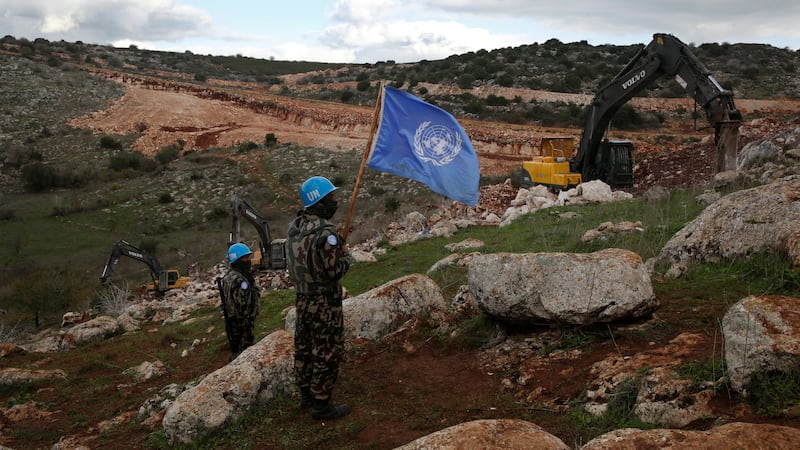
While diplomatic efforts go on, IDF is bracing for short but devastating war in Lebanon
As Defense Minister Gallant met with US envoy Amos Hochstein in DC, escalations by Hezbollah cast doubt on notion anything but a military solution will deter the terror group
ZIONISTS ALIGHT THE MIDDLE EAST
IN WAR OF EXPANSION
TIMES OF ISRAEL (TOI)
Interestingly, throughout the months-long conflict, Hezbollah has chosen to send Palestinian groups rather than its own people to carry out such infiltration attempts. The organization appears to be doing this in order to be able to portray the acts as ostensibly tied to the defense of Gaza, rather than unprovoked aggression.
In an official announcement after the elimination of the terror cell, the IDF emphasized that the strike was conducted to thwart an imminent attack. It is quite possible that Israel had been following the cell for some time.
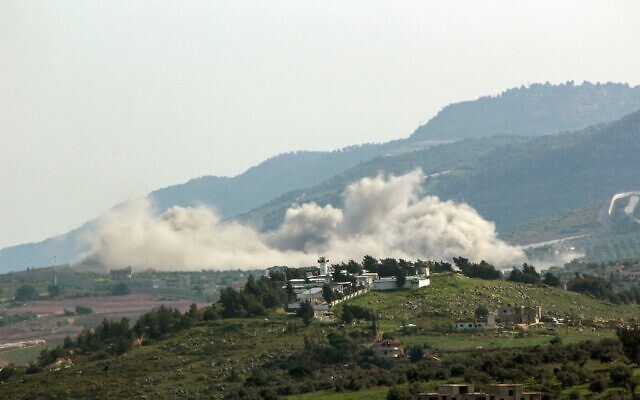
Smoke billows during Israeli bombardment on the village of Kfarkila in southern Lebanon near the border with Israel on March 26, 2024. (Rabih Daher/AFP)
Hezbollah was quick to respond to the strike, accusing Israel of massacring civilians and launching a barrage of 30 rockets at Kiryat Shmona and the surrounding area.
One of the rockets struck and killed 25-year-old Zaher Bashara in the Druze village of Ein Qiniyye.
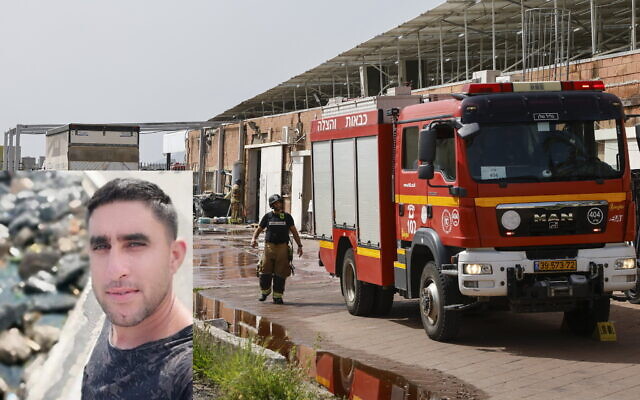
Firefighters and medics at the scene of a deadly rocket strike in Kiryat Shmona on March 27, 2024. Inset: Zaher Bashara, who was killed in the strike. (Jalaa MAREY / AFP)
The escalation in cross-border fire came at the end of Defense Minister Yoav Gallant’s visit to Washington, where he met with the US special envoy to the region Amos Hochstein, who has been leading efforts to find a diplomatic solution to the Israel-Hezbollah standoff.
Despite the latest Israeli fatality caused by Hezbollah, Israel is committed to staying the course with Hochstein as he tries to find a way out of the crisis.
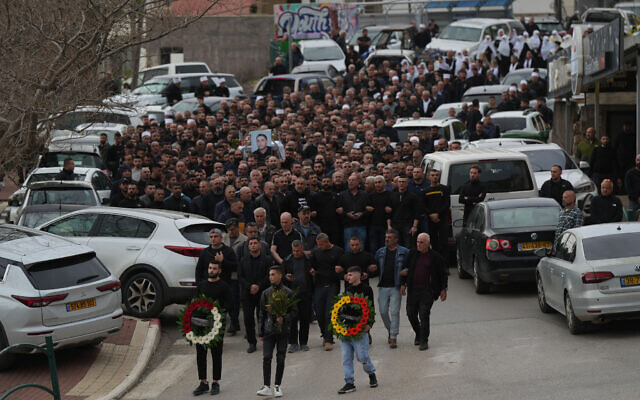
Family and friends attend the funeral of Zaher Bashara who was killed by a rocket fired from Lebanon, in the Druze village of Ein Qiniyye, northern Israel, March 27, 2024. (Ayal Margolin/Flash90)
Israel’s Archimedean point is unchanged for now: Gaza comes first. Everything else will wait for a time when conditions are right.
But that doesn’t mean Israel isn’t preparing for an expanded conflict on the northern front.
Drilling for a short war; watching a ‘considerable’ retreat
On Wednesday, battalion commanders in the IDF completed a seminar organized by the 36th Division in preparation for a possible offensive in Lebanon. The division, which was stationed in Gaza for more than three months at the start of the war, shared its lessons from the fighting and how they may be implemented in Lebanon.
And on Thursday the IDF said it carried out a surprise exercise aimed at preparing the military for war in the north. The drill, led by the Operations Division, involved all the IDF’s commands, wings and directorates, as well as the General Staff.
Still, as far as the IDF is concerned, the current situation in southern Lebanon with regard to Hezbollah’s deployment is fundamentally different from that of Hamas in Gaza on October 7.
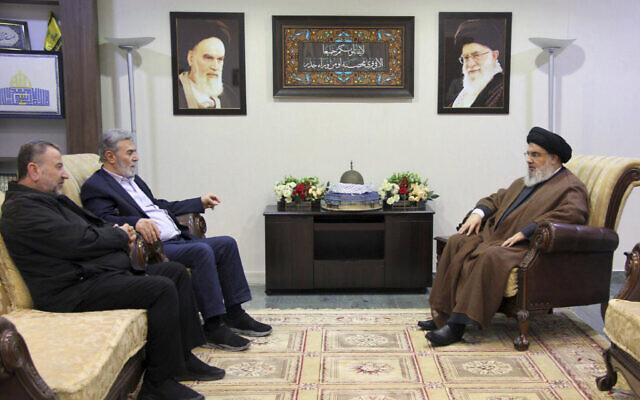
In this photo released on October 25, 2023, by the Hezbollah Media Relations Office, Hezbollah leader Hassan Nasrallah, right, meets with Ziad al-Nakhaleh, the head of Palestinian Islamic Jihad, center, and Hamas deputy chief, Saleh al-Arouri, in Beirut, Lebanon. (Hezbollah Media Relations Office, via AP )
“Practically, we aren’t that far from [UN Resolution] 1701, in terms of Hezbollah presence,” a senior security official said, referring to the motion that ended the 2006 Second Lebanon War, and which mandated that Hezbollah forces retreat kilometers from the border — a resolution the terror group has patently ignored for many years.
“The organization has retreated considerably [in recent weeks], including the Radwan forces that had been deployed along the border in the last year,” he said, referring to the elite commandos seen as a particular threat by Israel. “So the threat of a raid is significantly decreased.”
This raises the question of whether residents of evacuated northern communities should be able to return home. After all, the threat of a Hamas-esque invasion was the chief reason for the rapid evacuation of northern border communities at the start of the war in Gaza.
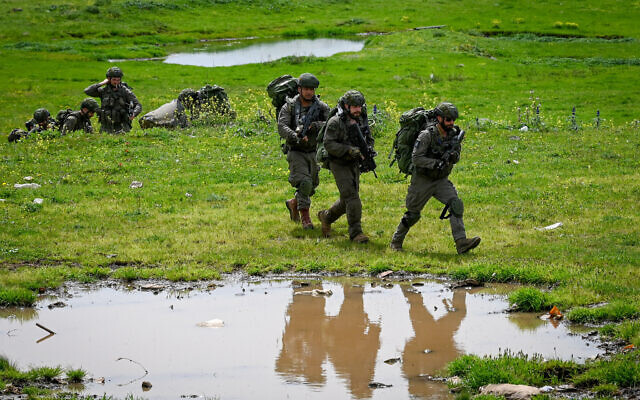
Israeli reserve soldiers train with their unit in urban warfare in northern Golan Heights, on March 27, 2024. (Michael Giladi/ Flash90)
Such a decision can only be made by political leaders, and until they do decide, official policy remains the same — residents will only be allowed to return after Hezbollah is removed from the border, peacefully or otherwise.
Hitting ‘Hezbollah’ or ‘Lebanon’
“The next Lebanon war, whenever it breaks out, will be shorter than we think, especially because of the issue of international legitimacy,” a diplomatic source told The Times of Israel’s Hebrew-language sister site Zman Yisrael.
“International scrutiny of events in Lebanon is different from that in Gaza,” the source said. “There are many Western nations and international bodies involved in Lebanon, and therefore the time Israel would have to operate against Hezbollah in Lebanon would be far less than that afforded to it in Gaza.”
This means Israel will need to prepare a lethal plan of action, one that will bring about the desired goals in a very short time. Israel has not specified what that will look like, but it’s clear that a war would be a matter of weeks and not longer.
Some in the IDF hold an optimistic view on the prospects for such action and have presented their position to political leaders. The latter will no doubt examine it carefully, for fear an operation could stall and fizzle out as in the Second Lebanon War in 2006, dealing a heavy blow to Israeli deterrence.
The intensity of such a war must be taken into account — both in the damage Israel will suffer and that caused to Lebanon. The ferocity of such a war, particularly when taking into account Hezbollah’s massive stock of missiles and rockets, only underlines the need for a swift, decisive campaign.
Nearly six months into the conflict, Israel is still finding it difficult to define when the Rubicon will be crossed — when it would have to move from harming strictly Hezbollah to the Lebanese state itself.
An adherence to the principle of not harming Lebanese state assets could in the end mean a longer war, and severe damage to the projection of Israeli power and its regional deterrence.
This article first appeared in Hebrew on the Times of Israel’s sister site Zman Yisrael.
30 March 2024
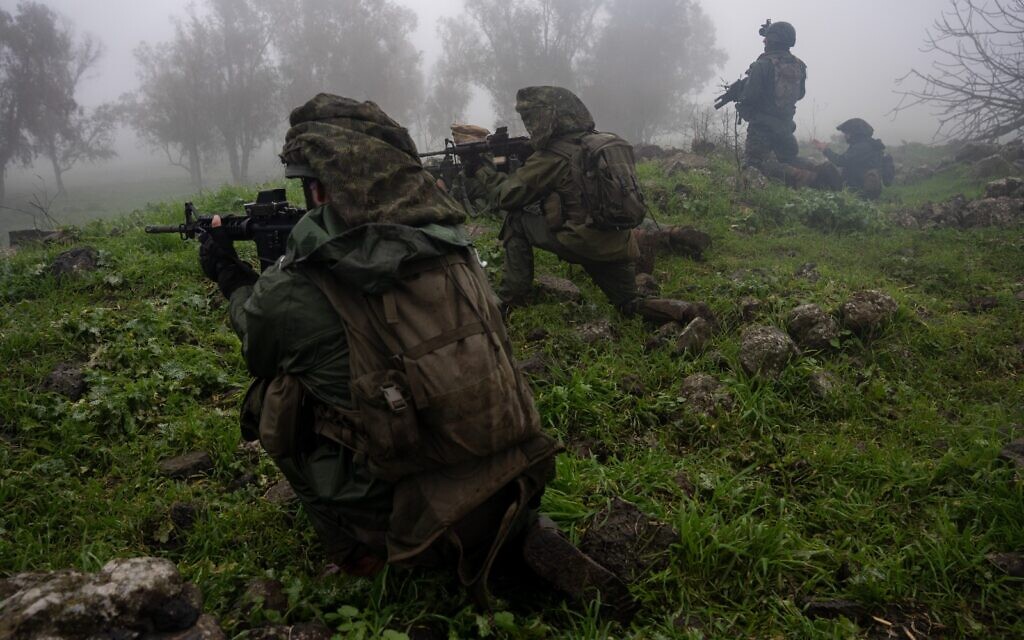
Troops of the 226th Reserve Paratroopers Brigade carry out a drill in northern Israel, in a handout image published January 27, 2024. (Israel Defense Forces)
The last few days on the Israeli border with Lebanon can be defined as violence-heavy. Both sides are on an escalatory ladder, and both are climbing it, trying to stay on top — while avoiding stepping too high.
A symmetry of sorts has taken shape in the north over the last five months, as Hezbollah has maintained its near-daily attacks on Israel and the Jewish state has responded in kind, a symmetry reflected not just in strikes but in the civilian toll as well. Just as Israel felt compelled to establish a kind of “security zone” in the north, evacuating tens of thousands of residents from towns near the border, similar action has been taken in south Lebanon. Some 80,000 residents of northern Israel have been forced to leave their homes amid the hostilities. According to Israeli estimates, more than 120,000 Lebanese have become internally displaced by the fighting.
In certain south Lebanese villages where Israel has intelligence on a major Hezbollah presence, the IDF’s fire policy is strict: Anyone defined as a suspect is attacked.
Amid the daily cross-border attacks, Wednesday’s Israeli strike in Lebanon — in which seven members of the Jamaa al-Islamiya terror group planning to carry out an infiltration attack on the border were killed — was different from what we’ve seen so far, both in scope and in the identity of those killed.
The terror cell in question was made up of Palestinians active in an extremist Sunni Islamist organization centered in the coastal cities of Tyre and Sidon, who were eliminated far from their normal area of operations. They appeared to choose the Mount Dov area for their planned attack, with the lack of a border fence making it relatively easier to infiltrate into Israeli territory.

Troops of the 226th Reserve Paratroopers Brigade carry out a drill in northern Israel, in a handout image published January 27, 2024. (Israel Defense Forces)
The last few days on the Israeli border with Lebanon can be defined as violence-heavy. Both sides are on an escalatory ladder, and both are climbing it, trying to stay on top — while avoiding stepping too high.
A symmetry of sorts has taken shape in the north over the last five months, as Hezbollah has maintained its near-daily attacks on Israel and the Jewish state has responded in kind, a symmetry reflected not just in strikes but in the civilian toll as well. Just as Israel felt compelled to establish a kind of “security zone” in the north, evacuating tens of thousands of residents from towns near the border, similar action has been taken in south Lebanon. Some 80,000 residents of northern Israel have been forced to leave their homes amid the hostilities. According to Israeli estimates, more than 120,000 Lebanese have become internally displaced by the fighting.
In certain south Lebanese villages where Israel has intelligence on a major Hezbollah presence, the IDF’s fire policy is strict: Anyone defined as a suspect is attacked.
Amid the daily cross-border attacks, Wednesday’s Israeli strike in Lebanon — in which seven members of the Jamaa al-Islamiya terror group planning to carry out an infiltration attack on the border were killed — was different from what we’ve seen so far, both in scope and in the identity of those killed.
The terror cell in question was made up of Palestinians active in an extremist Sunni Islamist organization centered in the coastal cities of Tyre and Sidon, who were eliminated far from their normal area of operations. They appeared to choose the Mount Dov area for their planned attack, with the lack of a border fence making it relatively easier to infiltrate into Israeli territory.
Interestingly, throughout the months-long conflict, Hezbollah has chosen to send Palestinian groups rather than its own people to carry out such infiltration attempts. The organization appears to be doing this in order to be able to portray the acts as ostensibly tied to the defense of Gaza, rather than unprovoked aggression.
In an official announcement after the elimination of the terror cell, the IDF emphasized that the strike was conducted to thwart an imminent attack. It is quite possible that Israel had been following the cell for some time.

Smoke billows during Israeli bombardment on the village of Kfarkila in southern Lebanon near the border with Israel on March 26, 2024. (Rabih Daher/AFP)
Hezbollah was quick to respond to the strike, accusing Israel of massacring civilians and launching a barrage of 30 rockets at Kiryat Shmona and the surrounding area.
One of the rockets struck and killed 25-year-old Zaher Bashara in the Druze village of Ein Qiniyye.

Firefighters and medics at the scene of a deadly rocket strike in Kiryat Shmona on March 27, 2024. Inset: Zaher Bashara, who was killed in the strike. (Jalaa MAREY / AFP)
The escalation in cross-border fire came at the end of Defense Minister Yoav Gallant’s visit to Washington, where he met with the US special envoy to the region Amos Hochstein, who has been leading efforts to find a diplomatic solution to the Israel-Hezbollah standoff.
Despite the latest Israeli fatality caused by Hezbollah, Israel is committed to staying the course with Hochstein as he tries to find a way out of the crisis.

Family and friends attend the funeral of Zaher Bashara who was killed by a rocket fired from Lebanon, in the Druze village of Ein Qiniyye, northern Israel, March 27, 2024. (Ayal Margolin/Flash90)
Israel’s Archimedean point is unchanged for now: Gaza comes first. Everything else will wait for a time when conditions are right.
But that doesn’t mean Israel isn’t preparing for an expanded conflict on the northern front.
Drilling for a short war; watching a ‘considerable’ retreat
On Wednesday, battalion commanders in the IDF completed a seminar organized by the 36th Division in preparation for a possible offensive in Lebanon. The division, which was stationed in Gaza for more than three months at the start of the war, shared its lessons from the fighting and how they may be implemented in Lebanon.
And on Thursday the IDF said it carried out a surprise exercise aimed at preparing the military for war in the north. The drill, led by the Operations Division, involved all the IDF’s commands, wings and directorates, as well as the General Staff.
Still, as far as the IDF is concerned, the current situation in southern Lebanon with regard to Hezbollah’s deployment is fundamentally different from that of Hamas in Gaza on October 7.

In this photo released on October 25, 2023, by the Hezbollah Media Relations Office, Hezbollah leader Hassan Nasrallah, right, meets with Ziad al-Nakhaleh, the head of Palestinian Islamic Jihad, center, and Hamas deputy chief, Saleh al-Arouri, in Beirut, Lebanon. (Hezbollah Media Relations Office, via AP )
“Practically, we aren’t that far from [UN Resolution] 1701, in terms of Hezbollah presence,” a senior security official said, referring to the motion that ended the 2006 Second Lebanon War, and which mandated that Hezbollah forces retreat kilometers from the border — a resolution the terror group has patently ignored for many years.
“The organization has retreated considerably [in recent weeks], including the Radwan forces that had been deployed along the border in the last year,” he said, referring to the elite commandos seen as a particular threat by Israel. “So the threat of a raid is significantly decreased.”
This raises the question of whether residents of evacuated northern communities should be able to return home. After all, the threat of a Hamas-esque invasion was the chief reason for the rapid evacuation of northern border communities at the start of the war in Gaza.

Israeli reserve soldiers train with their unit in urban warfare in northern Golan Heights, on March 27, 2024. (Michael Giladi/ Flash90)
Such a decision can only be made by political leaders, and until they do decide, official policy remains the same — residents will only be allowed to return after Hezbollah is removed from the border, peacefully or otherwise.
Hitting ‘Hezbollah’ or ‘Lebanon’
“The next Lebanon war, whenever it breaks out, will be shorter than we think, especially because of the issue of international legitimacy,” a diplomatic source told The Times of Israel’s Hebrew-language sister site Zman Yisrael.
“International scrutiny of events in Lebanon is different from that in Gaza,” the source said. “There are many Western nations and international bodies involved in Lebanon, and therefore the time Israel would have to operate against Hezbollah in Lebanon would be far less than that afforded to it in Gaza.”
This means Israel will need to prepare a lethal plan of action, one that will bring about the desired goals in a very short time. Israel has not specified what that will look like, but it’s clear that a war would be a matter of weeks and not longer.
Some in the IDF hold an optimistic view on the prospects for such action and have presented their position to political leaders. The latter will no doubt examine it carefully, for fear an operation could stall and fizzle out as in the Second Lebanon War in 2006, dealing a heavy blow to Israeli deterrence.
The intensity of such a war must be taken into account — both in the damage Israel will suffer and that caused to Lebanon. The ferocity of such a war, particularly when taking into account Hezbollah’s massive stock of missiles and rockets, only underlines the need for a swift, decisive campaign.
Nearly six months into the conflict, Israel is still finding it difficult to define when the Rubicon will be crossed — when it would have to move from harming strictly Hezbollah to the Lebanese state itself.
An adherence to the principle of not harming Lebanese state assets could in the end mean a longer war, and severe damage to the projection of Israeli power and its regional deterrence.
This article first appeared in Hebrew on the Times of Israel’s sister site Zman Yisrael.
No comments:
Post a Comment